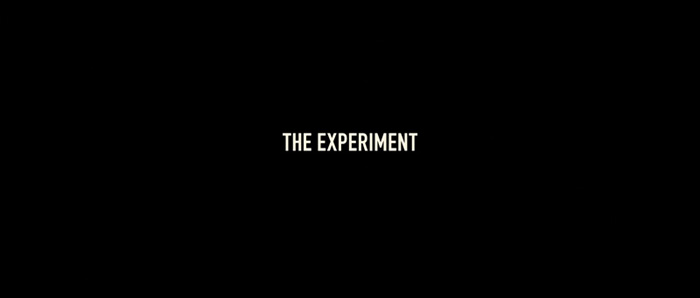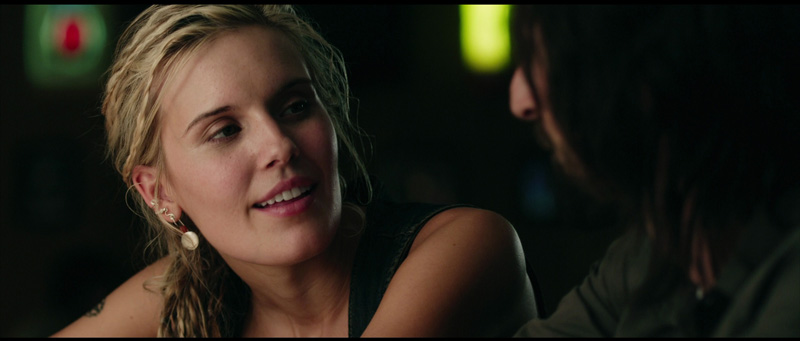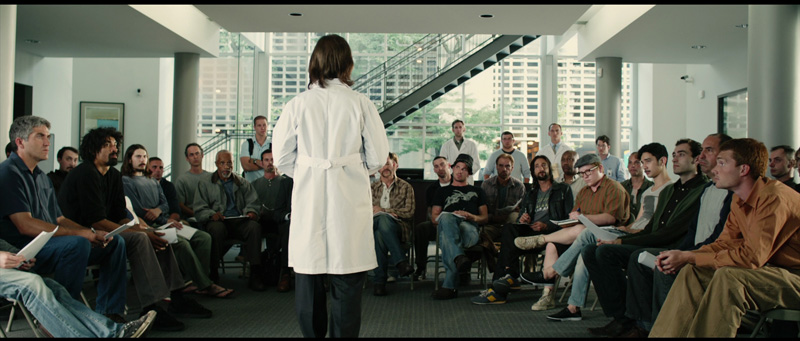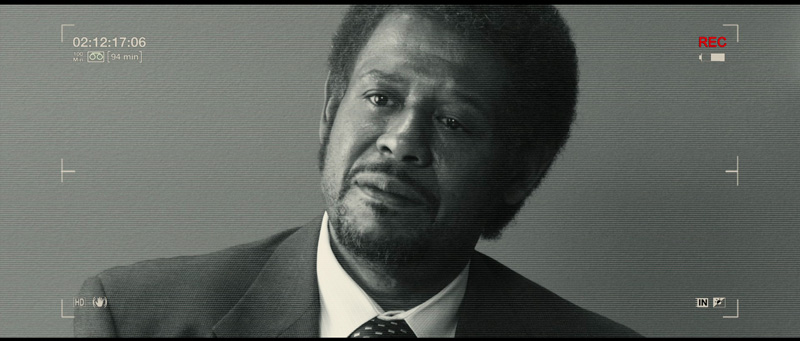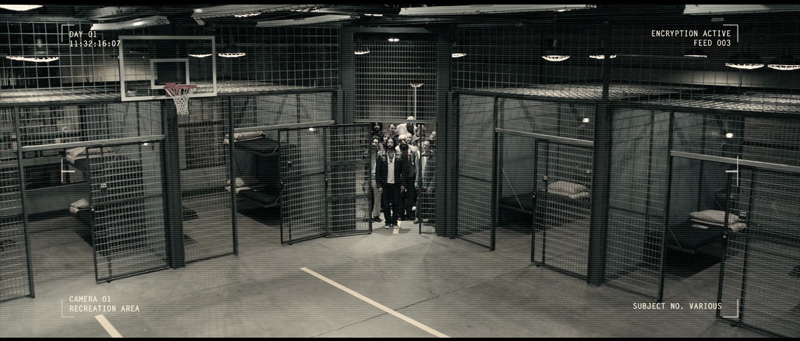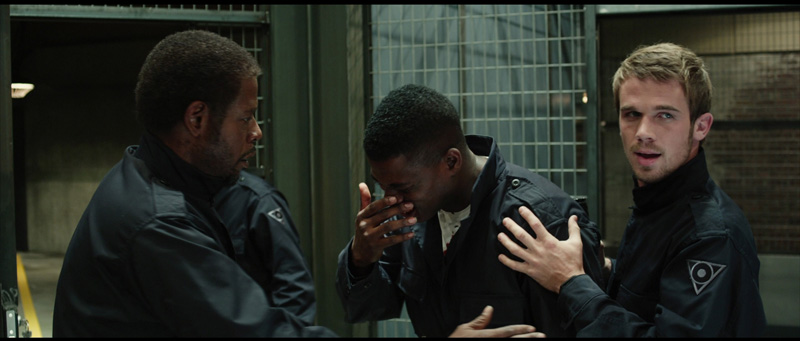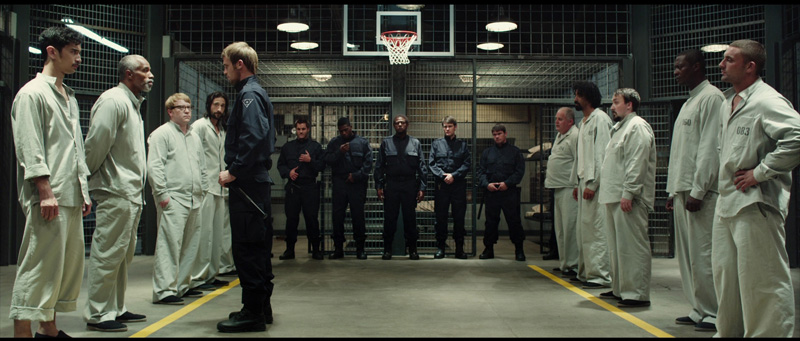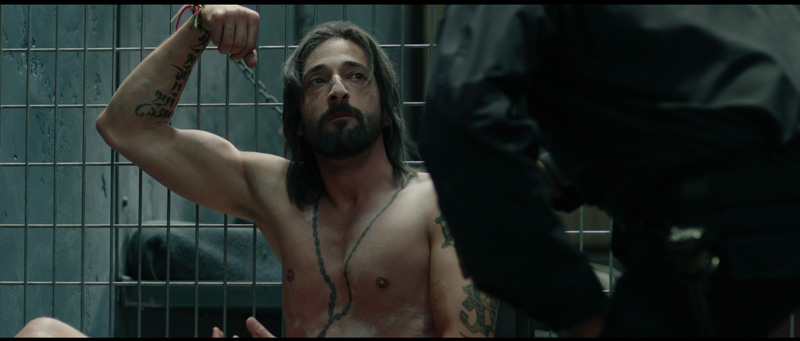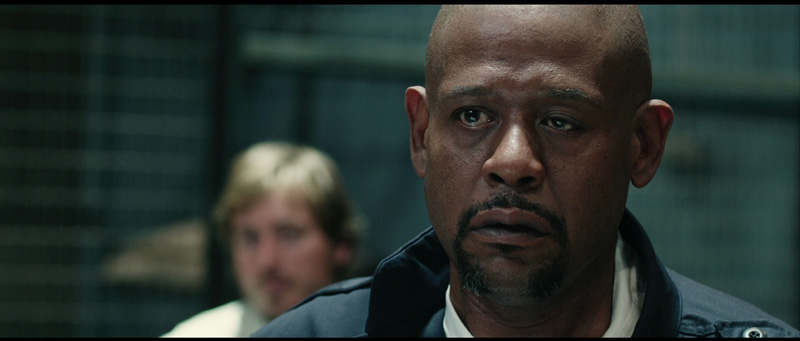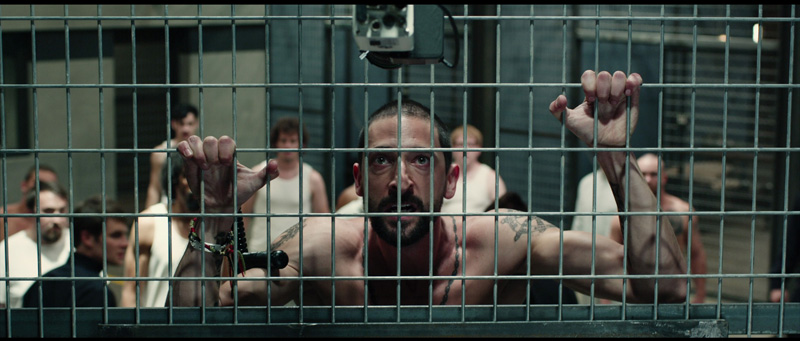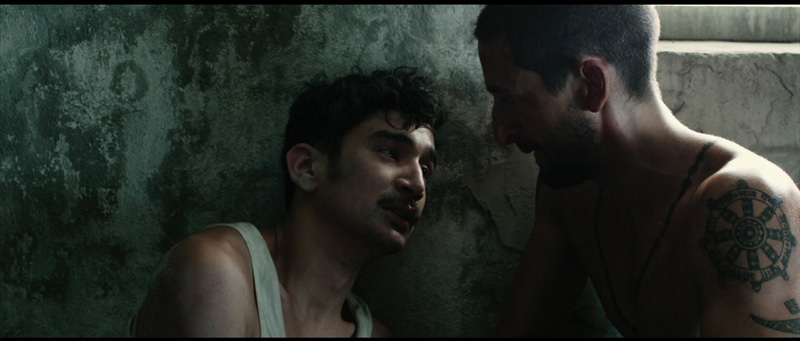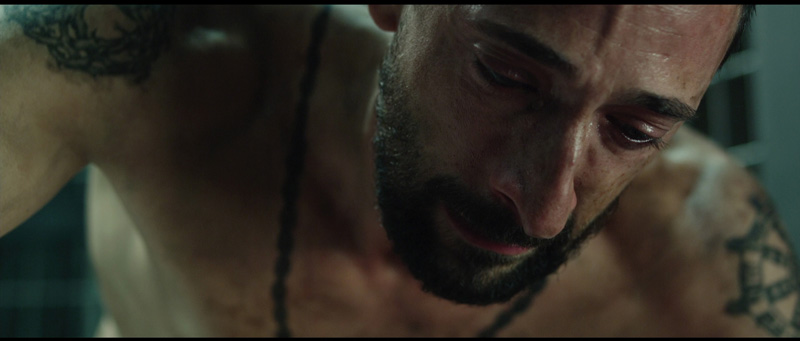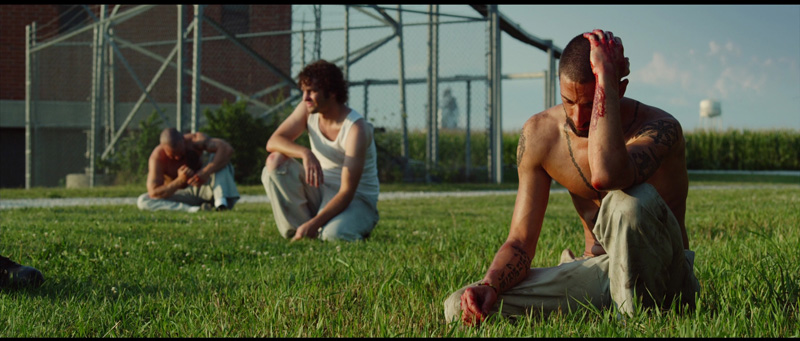Review by Leonard Norwitz
Production:
Theatrical: Adelstein Productions/Mercator/Natural Selection
Blu-ray: Sony Pictures Home Entertainment
Disc:
Region: FREE!
Runtime: 1:36:05
Disc Size: 25,924,648,701 bytes
Feature Size: 23,374,540,800 bytes
Video Bitrate: 26.89 Mbps
Chapters: 16
Case: Amaray Blu-ray Case
Release date: September 21st, 2010
Video:
Aspect ratio: 2.40:1
Resolution: 1080P / 23.976 fps
Video codec: MPEG-4 AVC Video
Audio:
DTS-HD Master Audio English 3770 kbps 5.1 / 48 kHz / 3770
kbps / 24-bit (DTS Core: 5.1 / 48 kHz / 1509 kbps / 24-bit)
Subtitles:
English, English SDH, None
Extras:
• (none)
Description: There’s a good deal of gestation going on here,
as Paul Scheuring’s The Experiment is a remake of Oliver Hirschbiegel’s 2001 film
Das Experiment, which was based on
Mario Giordano’s book Black Box, which itself was inspired
by the 1971 Stanford prison experiment (see
HERE)
Both the 2001 film and the new movie focus on a couple dozen
men who volunteer for a simulated prison experiment. The men
are assigned the role of either guard or prisoner presumably
to study the effects of power and control on their psyches
and behavior. The new movie may mark the first time a
straight-to-video release was designated despite the
presence of two (count them) Oscar winning actors, in this
case Adrien Brody (The Pianist, 2002) and Forest Whitaker
(The Last King of Scotland, 2006).
The Film:
5
Brody plays Travis, an out of work nurse’s aide who
volunteers for the experiment, for which he expects to be
paid handsomely, and after which he plans to go to India and
hook up with his new girlfriend (Maggie Grace). We meet a
number of the other volunteers as they are interviewed and
given various preliminary tests, ostensibly to sort out
their eligibility, but more likely, we imagine, to sort out
who will be assigned as guards and who as prisoners. Travis
is a laid back fellow whose moral code, he says, derives
from his own sense of right and wrong.
Barris (Whitaker), who comes to the interviews and arrives
at the “prison” in a suit, makes a point of defining his
moral values in terms of his strong religious upbringing.
There’s nothing subtle about how these two archetypes are
positioned – so we are not surprised when Barris is culled
out for guard duty, nor are we surprised that his black and
white notions about right and wrong lead him down the path
he takes with a vengeance.
The objectives of the Stanford experiment and of the movie
are quite different. In the original experiment, the
questions were: Given roles of power and submission, would
“humanity” win out over abuse, and to what extent does peer
pressure play a part? The movie accepts the unhappy
conclusion of the original (in just a few days the “guards”
became sadistic and the “prisoners” displayed symptoms of
acute stress and depression), so it makes it a lot easier to
follow the decisions and behaviors of the characters for
Scheuring for him to stack the deck with types and
oversimplify the action.
Indeed, complexity of character takes a backseat to an
almost predetermined series of actions. We might wonder how
na´ve can a guy be to volunteer for such a project, but for
a diabetic dweeb like Benjy the “Flying Man” (Ethan Cohn)
the question challenges the imagination. As for the
“prisoners” I found it hard to accept how easily, quickly
and aggressively they challenge the authority of the guards,
having no clue that they, and eventually, the prisoners,
would take their roles so seriously . . . which brings us to
the carrot:
The person in charge of the experiment (Fisher Stevens)
lists the Rules which, he states emphatically, if broken by
any one person, then the “red light” goes on and the
experiment is over and no one will be paid their
compensation of $14,000 per man. You can imagine with such a
carrot that motivation is high to stick to the rules. But
what you might not anticipate – and this is what Scheuring
wants us to understand – is how each person will rationalize
and accept behavior if no action is taken by those in
charge. For example, one of the rules is: no violence is to
be tolerated. Another is that ALL the food served must be
eaten. If the red light does not go on after a food fight or
after a little violence, then something about the conditions
of the experiment needs to be re-evaluated. But what? No one
ever asks.
Moral authority and intelligence of the higher power is
always assumed. The guards constantly make the assumption
that those in charge know what they are doing and that the
conditions of the experiment are as dictated, despite
evidence to the contrary. I suspect Scheuring sees his movie
as a metaphor for the relationship between Man and God – or,
at least between Man and the Church, but such an idea is
never articulated.
In any case the idea that people, the guards in this case,
bequeath moral authority outside themselves is a smart one,
if only the prisoners weren’t depicted as being as stupid as
they are and the guards so quick to try on command. To wit:
Very early on one of the prisoners accidentally hits a guard
in the face with a basketball. Two Rules are thus set in
motion: One states that no prisoner is allowed to touch a
guard, another is that if any rule is broken, commensurate
punishment must be exacted. The guards believe they must
require some measure of punishment. The prisoners feel that
the incident was an accident. The guards line everyone up
and demands ten push-ups of the offending prisoner, who, in
turn, has the temerity to demand a little civility in the
asking.
Now we like this particular prisoner up until now. We even
like that he wants and expects to be treated with respect
while being “punished.” Mind you, we are talking about ten
push-ups here, not one hundred. Push-ups, not lashes. And
with $14,000 in the balance it is hard not to wonder why no
one – no one – sees the humor of the situation, or, at the
least, that ten push-ups is the guards attempt to go along
with the rule that demands they act.
We can see this is going to be a bumpy, sadistic ride, for
the dye is cast: if the prisoners are willing to challenge
the authority of the guards over a mere ten push-ups, then
it‘s time to show the prisoners who’s boss here. The
audience needs only sit back and enjoy the brutality,
speculating only if any modicum of decency will prevail, and
what roles Barris and Travis will play in this.
And if it does, or doesn’t, will Travis get out alive, let
alone to India? In any case, would he trade in his “liberal
hippie” credential and become a Republican? If Barris were
to survive, what would he have learned about himself, or,
given the route he takes as a guard, would he be too
overwhelmed with shame to take it in – if he survives, I
mean. Does Scheuring position his movie only as a sadistic
adrenalin rush for his audience, which would be fine, or
does he give his audience the space to consider moral
questions. Is The Experiment a leaner, meaner version of The
Lord of the Flies or is it just Predators played out in a
confined space? Can there be any doubt?

Image:
8/9
NOTE:
The below
Blu-ray
captures were taken directly from the
Blu-ray
disc.
The first number indicates a relative level of excellence
compared to other Blu-ray video discs on a ten-point scale.
The second number places this image along the full range of
DVD and Blu-ray discs.
While not a particularly high-resolution picture for an high
voltage action flic, the image gives the impression of film.
Textures of skin, fabric, and metal are somewhat glossed
over, but I don’t see this as DNR. The transfer retains the
various bluish and desaturated filters of the movie, shadow
detail is good, what there is of it given its tendency to
high contrast and swaths of black. Other than this, I found
no transfer artifacts, enhancements or blemishes.
CLICK EACH
BLU-RAY
CAPTURE TO SEE ALL IMAGES IN FULL 1920X1080 RESOLUTION
Audio & Music:
8/6
The uncompressed DTS audio mix is effective, if not as
threatening as I expected, considering the content and
setting. It’s never over-the-top, yet it has sufficient
bass, power and metal. Dialogue shape and size is faithful
to the space, clear even when whispered, and given a little
more resonance for Barris as he devolves into his godlike
stat
Operations:
7
For a movie without bonus features, The Experiment takes a
while to load, after which we are treated to an ad for Sony
HD 3D TV before settling into the main menu.

Extras:
1
Except for connection via BD Live, there are no on-board
Bonus Features
Bottom line:
6
While there are some inherent difficulties with the
screenplay, most do not rise to the level of completely
trashing the film. Far from it. It’s still a hoot to watch
the likes of Whitaker and Brody take their characters
seriously, utterly without subtlety. Given Scheuring’s
simplistic depiction of events I think the film would have
been far more potent if the Maggie Grace bookends, easy as
she is on the eyes, had been omitted altogether.
Leonard Norwitz
September 2nd, 2010
![]()
![]()

![]()
![]()
![]()
![]()

![]()
![]()


